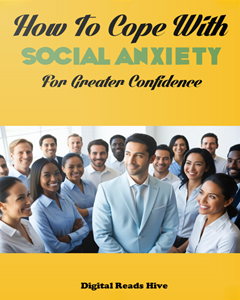Social interactions are an integral part of life, yet they can feel perplexing and overwhelming for some.
Often, the challenges of navigating social situations go unnoticed, presenting as subtle behaviors or feelings that are easy to dismiss.
You might shy away from attending gatherings, feel uneasy speaking to unfamiliar people, or overanalyze conversations long after they've ended.
These experiences can sometimes point to social anxiety, a condition that affects countless individuals, often in ways they don't immediately recognize.
Understanding the signs is a crucial step toward fostering self-awareness and finding strategies to overcome these obstacles.
Join us as we uncover the subtle signs that could be impacting your daily life.
1)) Avoiding Eye Contact
Avoiding eye contact is one of the subtle yet telling signs that you may be struggling with social anxiety.
For many individuals, maintaining eye contact during conversations can feel overwhelming, as it heightens feelings of vulnerability and self-consciousness.
This behavior often stems from a fear of being judged, misunderstood, or rejected.
While looking away or down can provide a temporary sense of relief, it may inadvertently signal discomfort to others, which might hinder social interactions or create a sense of disconnection.
Over time, this avoidance can reinforce feelings of isolation and exacerbate social anxiety.
Recognizing this pattern is a crucial first step in managing social anxiety, as it allows you to identify areas for growth and begin practicing small changes, such as gradually holding eye contact for slightly longer periods.
Building these habits over time can promote more meaningful connections and improve confidence in social settings.
2)) Fear Of Judgment
Fear of judgment is a hallmark of social anxiety and can manifest in a multitude of ways, often preventing individuals from fully engaging in everyday interactions.
This fear stems from an intense worry about how others perceive you, leading to avoidance of situations where evaluation or criticism might occur.
For instance, you might hesitate to join a group discussion, share your ideas in a meeting, or even attend social events out of fear that your actions, words, or appearance will be scrutinized.
These thoughts can spiral into self-criticism, heightened nervousness, and a sense of inadequacy, becoming barriers to personal and professional growth.
Recognizing this fear as a component of social anxiety is critical to addressing it.
Through self-compassion, reframing negative thoughts, and gradually confronting social challenges, it is possible to reduce the fear of judgment and build lasting confidence.
3)) Overthinking Conversations
Overthinking conversations is a common experience for those dealing with social anxiety.
After a social interaction, you may find yourself replaying the conversation in your mind, analyzing every word you said, and fearing you may have said something awkward or offensive.
This excessive self-reflection often stems from a deep-seated fear of negative judgment or rejection by others.
Overthinking can also result in avoiding future interactions altogether, as the prospect of making a perceived “mistake” becomes too daunting to bear.
To combat this, it is important to practice mindfulness and self-compassion.
Recognizing that no one is perfect in social situations and that most people are too focused on themselves to dwell on small missteps can help alleviate the intrusive thoughts.
Gradual exposure to social environments and celebrating small victories can also build confidence and reduce the habit of overanalyzing conversations over time.
4)) Difficulty Meeting New People
Difficulty approaching or meeting new people is a common indicator of social anxiety.
This challenge often stems from an overwhelming fear of judgment or rejection, causing individuals to feel paralyzed in social settings.
Even the prospect of a simple introduction can feel daunting, creating a cycle where avoidance becomes a coping mechanism.
Over time, this avoidance may lead to isolation and missed opportunities for personal and professional growth.
It’s important to remember that such struggles are not a reflection of one’s worth but rather a symptom of social anxiety, which is a treatable condition.
Building small, manageable steps towards engagement, such as starting with brief conversations or online interactions, can gradually help overcome this fear.
Seeking support from trusted friends, mentors, or a mental health professional can provide valuable tools and encouragement to foster meaningful connections and regain self-assurance in social environments.
5)) Excessive Worry About Social Events
Excessive worry about social events is a hallmark sign of social anxiety, a condition characterized by intense fear and self-consciousness in social situations.
This anxiety often stems from a deep concern about being judged, embarrassed, or rejected by others.
People struggling with social anxiety may find themselves overthinking upcoming events, imagining worst-case scenarios, or avoiding gatherings altogether to escape the discomfort associated with interacting with others.
This avoidance, while temporarily relieving, can lead to feelings of isolation and missed opportunities for personal and professional growth.
It's important to recognize that while some nervousness before social events is normal, persistent and overwhelming fear that interferes with daily life may indicate a deeper issue.
Seeking support through therapy, such as cognitive-behavioral therapy (CBT), or gradual exposure to social settings can help reduce these fears over time.
With patience and the right tools, those experiencing social anxiety can build confidence and learn to engage more comfortably in social interactions, ultimately improving their quality of life.
6)) Reluctance To Speak In Groups
Reluctance to speak in groups can be one of the most noticeable signs of social anxiety.
This hesitation often stems from an intense fear of being judged, criticized, or embarrassing oneself in front of others.
For individuals with social anxiety, the mere thought of speaking up in a group setting can evoke feelings of panic, increased heart rate, and even physical symptoms like sweating or trembling.
These feelings can make it incredibly difficult to contribute to discussions, even when they may have valuable insights or ideas to share.
Over time, this avoidance can lead to a pattern of isolation and missed opportunities for personal and professional growth.
Learning to recognize this reluctance as a potential sign of social anxiety is an important first step.
Seeking support through therapeutic strategies, such as exposure therapy or cognitive-behavioral techniques, can help individuals slowly build confidence and reduce the fear associated with group interactions.
With consistent effort and the right guidance, it is possible to break free from the constraints of social anxiety and engage more fully in group dynamics.
7)) Avoiding Phone Calls
Avoiding phone calls is a common behavior among individuals with social anxiety, and it often stems from the fear of being judged or saying the wrong thing.
Unlike in-person conversations, phone calls remove visual cues, which can make people with social anxiety feel more uncertain about how they are being perceived.
The thought of speaking "on the spot" or being unable to prepare a response can be paralyzing, leading them to ignore calls or rely on text messages as their primary mode of communication.
However, this avoidance can create practical challenges in both personal and professional settings, such as missed opportunities or strained relationships.
Overcoming phone call anxiety may require gradual steps, such as practicing with trusted friends or preparing conversational scripts before calls.
With time and persistence, it is possible to build confidence and reduce the overwhelming nature of phone interactions.
8)) Feeling Self-Conscious Often
Feeling excessively self-conscious in social settings can be a key indicator of social anxiety, a condition that affects many individuals on both emotional and physical levels.
This pervasive self-awareness often stems from a fear of being judged, embarrassed, or scrutinized by others, which can make even casual interactions feel overwhelming.
People experiencing this may overanalyze their words, gestures, or appearance, worrying about how they are perceived, even without clear feedback from those around them.
This heightened self-consciousness can lead to behaviors like avoiding eye contact, hesitating to share opinions, or withdrawing from social events altogether.
While these feelings may seem isolating, it’s important to recognize that they stem from a common condition.
Seeking support from therapists, engaging in cognitive behavioral strategies, or gradually exposing oneself to social scenarios can help address and alleviate these challenges, fostering a sense of confidence over time.
9)) Physical Symptoms During Interactions
Physical symptoms often accompany social anxiety, acting as a clear signal of the internal struggle an individual may be facing.
These symptoms can vary widely but commonly include rapid heartbeat, sweating, trembling, dry mouth, stomach discomfort, blushing, or even difficulty breathing.
Such physical reactions are not merely incidental; they are closely tied to the intense fear and self-consciousness experienced in social situations.
For instance, an individual might begin trembling while giving a presentation or feel nauseous while meeting new people, as their body reacts to the perceived threat of judgment or rejection.
Unfortunately, the presence of these symptoms can exacerbate feelings of embarrassment and contribute to a cycle of avoidance, further reinforcing the social anxiety.
Recognizing these physical signs as part of the condition is a vital step towards addressing them, as it allows individuals to seek appropriate coping strategies and professional support, helping to break the cycle and build confidence in social settings.
10)) Fear Of Embarrassing Yourself
One of the hallmark signs of social anxiety is an overwhelming fear of embarrassing oneself in social or public situations.
This fear often stems from the exaggerated belief that others are constantly judging or scrutinizing one's actions, appearance, or speech.
Individuals with social anxiety may replay past interactions in their minds, dissecting every word or gesture, and fearing they have done something wrong or foolish.
They may also avoid participating in conversations, giving presentations, or even attending social gatherings to minimize the risk of humiliation.
This persistent worry can create a cycle of avoidance, where opportunities for connection and growth are missed, reinforcing feelings of isolation and inadequacy.
Recognizing this fear as a symptom of social anxiety is a vital first step towards managing it.
With the right support system, including therapy and coping techniques, it's possible to challenge these negative thought patterns and rebuild confidence in social interactions.
11)) Overanalyzing Past Interactions
A common experience for those dealing with social anxiety is the habit of overanalyzing past interactions.
This often involves replaying conversations or events in their minds, scrutinizing every word and action, and fearing they may have said or done something wrong.
Such rumination can create a cycle of self-doubt and criticism, leading to heightened anxiety in future social situations.
These thoughts are usually rooted in the fear of negative judgment from others, even if the interaction was perceived as neutral or positive by others.
Over time, this pattern can become emotionally exhausting and reinforce feelings of isolation or inadequacy.
Recognizing this behavior and understanding that it is a symptom of social anxiety rather than a reflection of reality is an essential step toward breaking free from this cycle.
Seeking support from friends, engaging in self-compassion practices, or working with a therapist can help in addressing these thought patterns and reducing their impact on everyday life.
12)) Struggling With Small Talk
Struggling with small talk can often be an indicator of social anxiety, a condition that affects millions of people worldwide.
For those experiencing this form of anxiety, the seemingly simple act of engaging in casual conversation can feel overwhelming or even terrifying.
Thoughts of being judged, saying the wrong thing, or coming across as awkward can dominate the mind, making it difficult to focus on the interaction itself.
This fear often leads to avoidance behaviors, which can create a cycle of isolation and heightened anxiety over time.
Small talk, while superficial to some, serves as a crucial social skill that helps build connections and maintain relationships, and the inability to participate comfortably in these exchanges can leave individuals feeling disconnected from others.
Recognizing this struggle as a sign of a deeper challenge is the first step toward change.
With the right tools, such as practicing mindfulness, gradually easing into social situations, or seeking professional support, individuals can work toward reducing their anxiety and improving their ability to engage more freely and confidently in everyday interactions.

Learn actionable strategies to overcome social anxiety and unlock your full potential with How To Cope With Social Anxiety For Greater Confidence. This empowering e-book is your ultimate guide to building self-esteem, mastering social situations, and thriving with confidence. Don’t wait—purchase your copy today and start your transformation!
Conclusion
Social anxiety can often feel overwhelming and isolating, but recognizing the signs is the first step toward reclaiming your confidence and peace of mind.
The subtle indicators we’ve discussed might resonate with you or someone close to you, and it’s important to remember that these experiences are more common than you may think.
Seeking support—whether through therapeutic resources, friends, or community groups—can provide a path toward healing and empowerment.
By addressing these challenges head-on, you can unlock the potential to engage more fully in relationships, pursue goals without fear of judgment, and build a life of greater authenticity and connection.
Social anxiety doesn’t have to define your story; with the right strategies and tools, it’s possible to step beyond the shadows of fear and into a brighter, more fulfilling future.
Related Articles and Guides
- 10 Social Anxiety Tips That Actually Work
- How To Cope With Social Anxiety
- Coping With Social Anxiety: 10 Questions Explained Truthfully
- 10 Proven Social Anxiety Tips To Overcome Your Fears
- 10 Social Anxiety Hacks To Conquer Shyness And Feel Confident
Download Our Free E-book!







